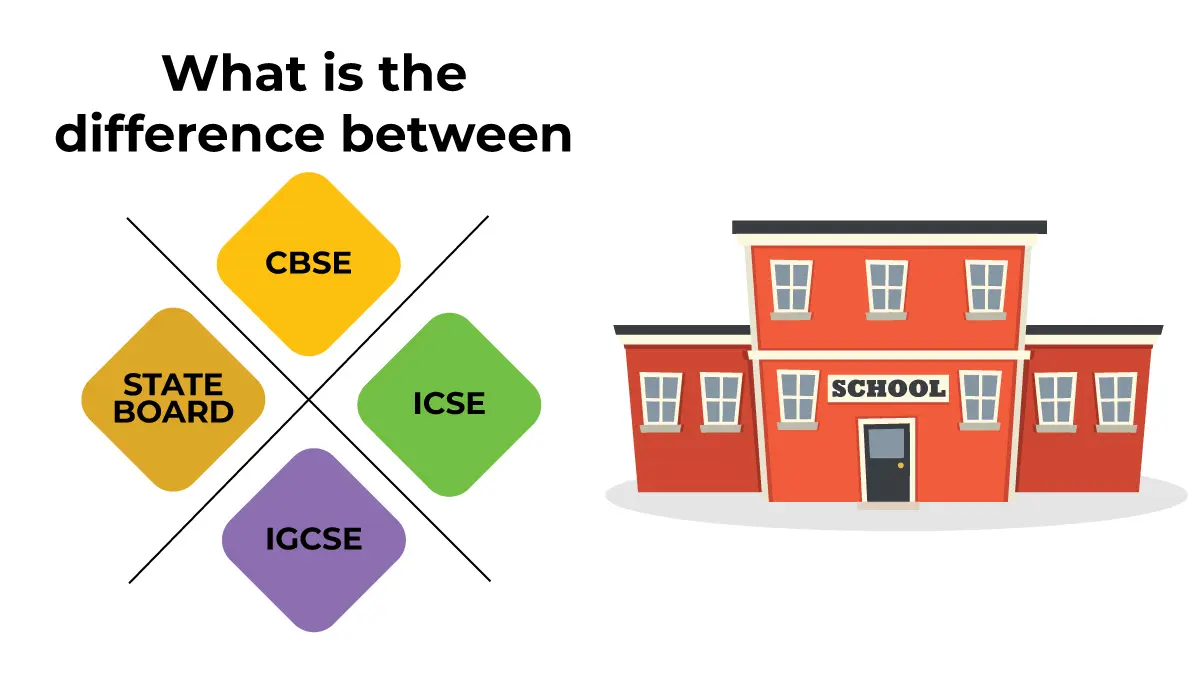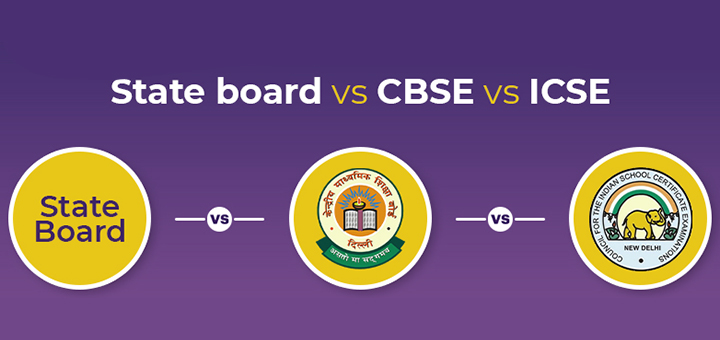Choosing the right educational board is one of the most important decisions a parent can make for their child’s academic and personal development. In India, the three major school boards—CBSE vs ICSE vs State Board—each have unique advantages, curriculum structures, and learning outcomes. Understanding the difference between CBSE vs ICSE vs State Board is essential for parents to make an informed choice based on their child’s learning style, goals, and future aspirations.
At Verified Campus, we understand how overwhelming it can be to select the right educational path. This article dives deep into comparing CBSE vs ICSE vs State Board so you can confidently choose the best board for your child’s future.
Understanding the Indian Education System
Before jumping into the debate of CBSE vs ICSE vs State Board, it’s important to understand what each board represents:
-
CBSE (Central Board of Secondary Education): A national-level board under the Union Government of India, popular for its structured curriculum and emphasis on science and mathematics.
-
ICSE (Indian Certificate of Secondary Education): Governed by the CISCE (Council for the Indian School Certificate Examinations), ICSE offers a comprehensive curriculum focused on English language and application-based learning.
-
State Board: Each state in India has its own education board, which aligns its curriculum to local language, culture, and regional development needs.
The debate between CBSE vs ICSE vs State Board often comes down to academic rigor, flexibility, subject depth, and long-term advantages in career or higher education.

Curriculum and Syllabus Structure
The curriculum is the first critical comparison point in the CBSE vs ICSE vs State Board debate.
-
CBSE follows a uniform national curriculum designed by NCERT. It places heavy emphasis on science and mathematics, making it ideal for competitive exams like IIT-JEE, NEET, and others.
-
ICSE offers a diverse and comprehensive curriculum with strong focus on language, arts, and practical knowledge. It encourages analytical thinking, project work, and application-based learning.
-
State Boards vary greatly in syllabus structure. While they are tailored to the local context, their depth and rigor may not match the national boards. However, they are often easier to follow and are well-suited for students staying in their home states.
Understanding the curriculum approach in CBSE vs ICSE vs State Board helps determine which board aligns best with your child’s learning capabilities and academic goals.
Medium of Instruction and Language Emphasis
Language proficiency is a major differentiator in CBSE vs ICSE vs State Board.
-
ICSE places the strongest emphasis on the English language. The board’s English curriculum is often more advanced, aiding in language development and communication skills.
-
CBSE offers bilingual instruction (English and Hindi) and is more flexible in regional language usage, but its English curriculum is not as in-depth as ICSE’s.
-
State Boards prioritize the regional language as a medium of instruction, though English is often a secondary language. This may influence a child’s ability to compete in national or international academic scenarios.
If language development, especially in English, is a key concern, CBSE vs ICSE vs State Board comparisons strongly favor ICSE in this area.
Teaching Methodology and Pedagogy
When it comes to teaching style, CBSE vs ICSE vs State Board differ significantly:
-
CBSE encourages theoretical learning with structured assessments. It is ideal for students preparing for engineering, medical, or civil services.
-
ICSE leans toward experiential learning, projects, and internal assessments. The methodology supports overall personality development and practical knowledge.
-
State Boards often focus on rote learning and state-level examinations. However, reforms in some states are slowly introducing modern pedagogy.
So, in the case of CBSE vs ICSE vs State Board, parents must choose based on whether they prefer competitive exam preparation or holistic education.
Assessment and Grading Patterns
Evaluation patterns play a crucial role in academic stress and learning outcomes. In comparing CBSE vs ICSE vs State Board:
-
CBSE uses a Continuous and Comprehensive Evaluation (CCE) model, with a mix of internal and board exams, reducing pressure on students.
-
ICSE involves detailed assessments, project work, and internal grading. The examination pattern can be rigorous, but it trains students for advanced academic levels.
-
State Boards follow traditional annual exams, and grading patterns vary from state to state. Some boards are adopting new techniques to stay on par with national standards.
Understanding how assessments work in CBSE vs ICSE vs State Board is key to managing academic pressure and performance expectations.
Recognition and Future Opportunities
A crucial factor in the CBSE vs ICSE vs State Board discussion is the recognition and acceptability of the boards nationally and internationally.
-
CBSE is recognized by almost every Indian college and a large number of international institutions. Its alignment with competitive exams makes it a practical choice for career-focused students.
-
ICSE is highly regarded by universities abroad due to its comprehensive curriculum and strong English foundation.
-
State Boards are ideal for students planning to pursue higher education within the same state. However, recognition outside the state or at the international level may be limited.
So, when looking ahead, comparing CBSE vs ICSE vs State Board helps weigh the long-term academic benefits.
Flexibility and Subject Choice
One of the major benefits of ICSE is the variety of subject combinations available. Let’s compare subject options in CBSE vs ICSE vs State Board:
-
CBSE offers standard subjects, but students have fewer elective choices.
-
ICSE provides a wide range of subjects including arts, humanities, environmental science, and home science, promoting interdisciplinary learning.
-
State Boards may have limited subject offerings depending on the region, but they often align better with local employment opportunities.
For well-rounded exposure and subject flexibility, CBSE vs ICSE vs State Board comparisons show ICSE having an edge.
Cost of Education
Parents also factor in financial considerations when choosing between CBSE vs ICSE vs State Board.
-
CBSE schools are moderately priced, with a large number of private and public schools available.
-
ICSE schools tend to be more expensive due to their infrastructure, teaching methodology, and international alignment.
-
State Board schools are often the most affordable, especially government-run institutions.
If budget is a constraint, CBSE vs ICSE vs State Board comparisons may tip in favor of State Boards.
Availability Across India
-
CBSE schools are widely spread across the country, making it easy for transferable families to maintain educational continuity.
-
ICSE schools are fewer in number but growing in metro cities.
-
State Boards dominate rural and state-level regions but may not offer easy transfers to different states or boards.
Considering geographical availability is essential when deciding between CBSE vs ICSE vs State Board.
Parental Involvement and Support
The level of parental involvement required also varies in CBSE vs ICSE vs State Board education systems.
-
CBSE provides structured guidelines that make it easy for parents to understand academic expectations.
-
ICSE may require more involvement due to project work and a diverse syllabus.
-
State Boards usually rely on conventional methods, with minimal parent engagement beyond exams.
Parents should assess their ability to participate actively before choosing among CBSE vs ICSE vs State Board.
Which is Best for Competitive Exams?
Competitive exams like NEET, JEE, and UPSC play a huge role in determining the future of many Indian students.
-
CBSE is specifically aligned with these exams, making it the preferred choice.
-
ICSE prepares students for international-level exams and higher studies abroad.
-
State Boards may require additional preparation through coaching for national-level exams.
This makes the CBSE vs ICSE vs State Board comparison particularly relevant for families targeting competitive exams.

The Role of Schools in Dehradun
When exploring CBSE vs ICSE vs State Board, the quality of the schools also matters. Schools in Dehradun, for example, are known for their academic excellence, offering all three types of boards.
Many renowned schools in Dehradun provide top-tier education whether you choose CBSE, ICSE, or State Board. The city has become an educational hub, helping students thrive regardless of the board.
So, when considering CBSE vs ICSE vs State Board, location-specific offerings like those in schools in Dehradun should not be overlooked.
Conclusion: What’s the Final Verdict?
After exploring every angle of CBSE vs ICSE vs State Board, it’s clear there’s no one-size-fits-all answer. The best board depends on your child’s learning preferences, career goals, language proficiency, and even your family’s lifestyle.
If your child is aiming for competitive exams in India, CBSE might be the best fit. For those looking for a well-rounded, English-rich, and application-based education, ICSE stands out. And if affordability and state-level education continuity are priorities, the State Board offers strong value.
Ultimately, whichever board you choose, ensure it aligns with your child’s personal and academic growth. Explore all options, including excellent schools in Dehradun, which offer quality education across all boards.
At Verified Campus, we’re here to guide you through these important decisions—so your child gets the best start in life.


Pingback: How to Choose the Right School in Dehradun? - Verified Campus